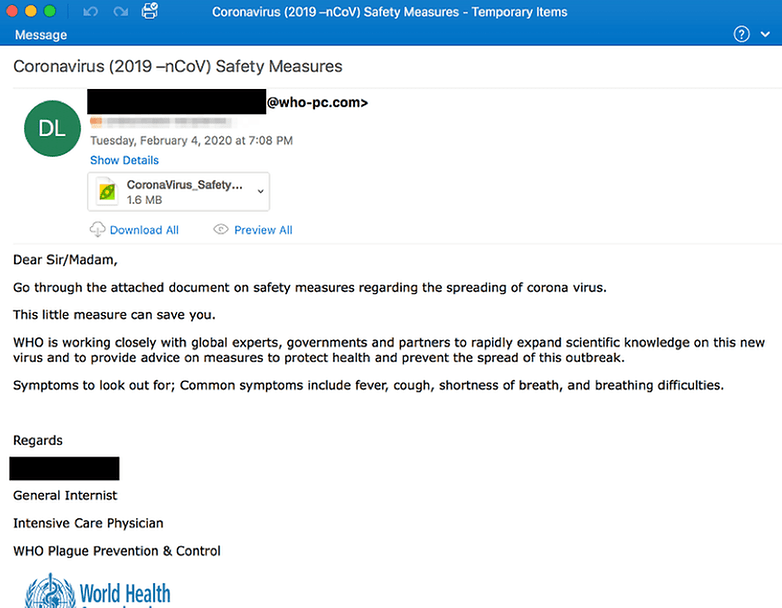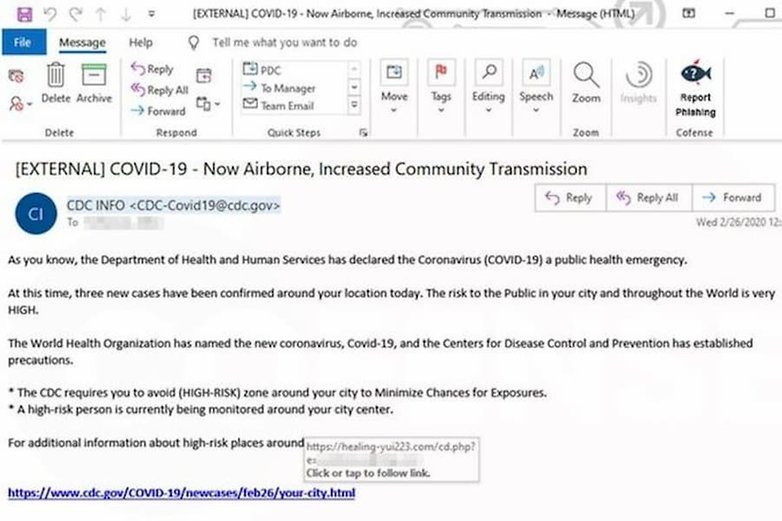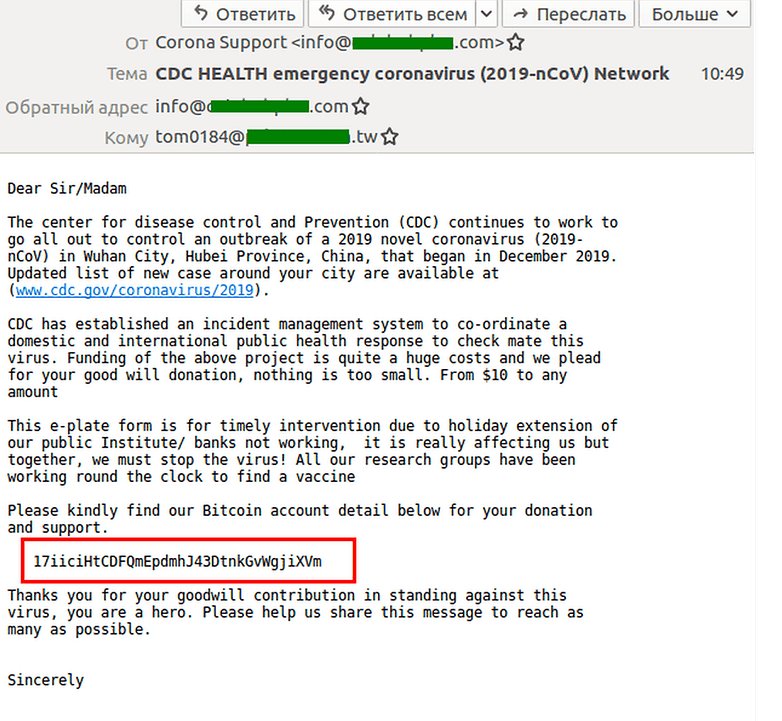Source: National Cyber Security – Produced By Gregory Evans
Cybercriminals use extremely sophisticated techniques to make life difficult for Internet users. Their preferred targets are unsuspecting individuals, from whom they try to steal personal data, as well as the industrial sector such as aerospace or the automobile industry, for whom manufacturing secrets or patents are worth money. Phishing email campaigns in English, French, Italian, Japanese, and Turkish are playing on the general fear of COVID-19, with all the risks that coronavirus represents for the security of your personal data. Here is a list of emails that should not be opened.
1. Click for a cure scams
Cybersecurity researchers at Proofpoint discovered as early as the beginning of February that many users had received a medical email. The message was supposedly from a mysterious doctor claiming to have details of a coronavirus vaccine harbored by the Chinese and British governments. On its website, the cybersecurity research and consultancy firm explains that people who click on the attached document are referred to a dummy web page (spoof website) designed to collect login information. It is estimated that this type of phishing practice is capable of sending 200,000 emails at a time. For Sherrod Degrippo, a member of the company’s threat detection and research team, this phenomenon seems to be a long-term trend:
“We’ve seen over 35 consecutive days of malicious email campaigns linked to the coronavirus, many exploiting fear to convince victims to click.”
According to Proofpoint, the best thing to do is to remain vigilant and never click on the links contained in such emails.
2. COVID-19 tax refunds or tax deductions
Researchers from the cybersecurity company Mimecast were the first to report this gigantic scam aimed at accessing the banking and tax data of thousands of citizens. During their initial investigations, they quickly detected different modus operandi. People received an email inviting them to click on “Access your funds now”. This link sent them to a fake government web page, encouraging them to enter all of their banking and tax information.
For Carl Wearm of Mimecast, people must be very careful and vigilant:
“Do not respond to any electronic communications regarding money by e-mail. And don’t click on any links in any related messages – that’s not how HMRC would inform you of a possible tax deduction.”
3. Bogus safety measure
This new scam may seem crude, but it has managed to grab the attention of many people. Just like the classic scams where hackers pose as government agents, here you receive an email from the so-called World Health Organization (WHO) representatives with an attachment. The title is then very catchy: “Coronavirus Safety Measures”. According to the specialized site Proofpoint, it is actually a software called AgentTesla Keylogger that could infect your computer. This software inserts itself into your operating system, records each of your documents and transmits the information to hackers.

As explained earlier, beware of emails claiming to be from the WHO, as they are probably false. Instead, visit the official WHO website for the latest advice on how to protect yourself from the pandemic.
4. “The virus is now airborne”, the virus has become volatile…
The technique used here looks more like a very bad science fiction movie and plays on the fear that coronavirus is spreading in society. Even though it sounds ridiculous, it still happens to catch some people out. According to these emails, COVID-19 is volatile and is transmitted through the air (which is false, the droplets through which it is transmitted cannot float in the air for long enough). This email, with its headline from a bad TV movie, is designed to look exactly like the ones sent by the Centers for Disease Control and Prevention (CDC). It uses one of the organization’s official e-mail addresses but is actually sent from computer tools that are used to hide the sender’s IP address. For the cyber defense company Cofense, this email directs victims to a fake Microsoft login page where people are encouraged to enter their email address and password. Victims are then redirected to the real CDC tips page, which makes the scam even more authentic, making it extremely simple for hackers to recover your private login data.

As Cofense reminds us, this type of scam targets the most vulnerable among us and remains a classic example of unscrupulous people whose weapons are fear and panic.
5. Donate here to help the fight scams
The latest example of a scam via phishing emails is reported by malware experts working for the Kaspersky firm. Once again, it is believed to be fake letters from the Centers for Disease Control and Prevention (CDC) asking for donations to develop a vaccine. Here, the e-mail requests payments to be made in Bitcoin. Although this request sounds ridiculous, it could potentially work because the email address and signature in the body of the text seem convincing. The security company Kaspersky says it has detected more than 513 different types of email with coronavirus in their subject lines. All of these emails are said to contain malware.

Like his colleagues working in the field of cybersecurity, Kaspersky’s senior security researcher David Emm believes that the trend of this type of threat is clearly on the rise and that its evolution will also depend on the evolution of the epidemic :
“We expect the numbers to increase, of course, as the real virus continues to spread.”
Are you taking steps to alert people who might be victims of this type of scam? What could you recommend to people who might fall into this type of scam? Share your advice below the line.
Source link
The post #cyberfraud | #cybercriminals | Coronavirus: how online scammers are exploiting COVID-19 fears appeared first on National Cyber Security.
